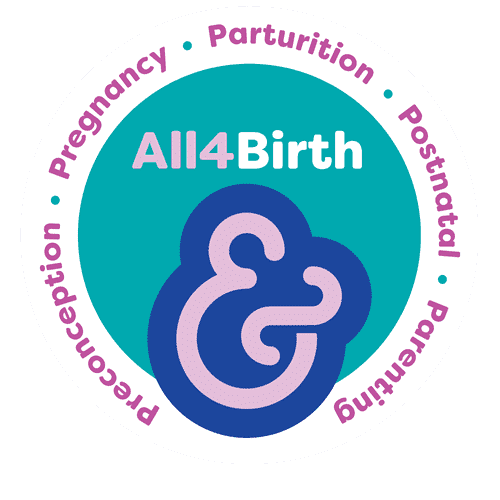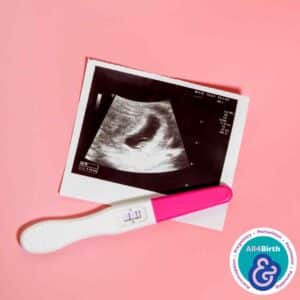The First Trimester
Abbie Tomson
BSc (Hons) Midwifery
Midwife
All4birth Lead
Instagram @all4birth
Summary
The first trimester is a time in pregnancy where so many changes, and in fact baby grows the most in this time than any other period in pregnancy! Finding out you’re pregnant can bring many questions and feelings, whether it was a planned or unplanned pregnancy. Here at All4Birth, we hope to guide you through preconception, pregnancy, labour and into parenthood and support you in this time of your life!
What is happening in the body during the 1st trimester?
The first trimester begins on the first day of your last period and lasts until the end of the 12th week- and a lot happens during this time! The fertilised egg rapidly divides into various layers of cells and implants into your uterus, where growth continues. At this stage, the baby is called an embryo. During the first trimester, your baby grows faster than at any other time in the pregnancy! From 6 weeks, a heartbeat can be heard and by the end of week 12, your baby’s bones, muscles and organs have formed!
Many find it helpful to have an app on their phone to track their pregnancy and see updates on their baby- a fantastic app is the ‘Baby Buddy‘ app, created by the Best Beginnings Charity and guides you through pregnancy and into the baby’s first year.
‘Morning’ (all day!) sickness:
Anyone who has been pregnant will understand that the phrase ‘morning sickness can be misleading, as it usually lasts beyond or even starts later in the day! Around 85% of women are affected by nausea, with approximately 50% experiencing vomiting1.It can begin at any point in the first trimester, but most will start to feel it subsiding after the first trimester, as the placenta takes over from the corpus luteum to maintain the pregnancy from this stage, and the hormone Human Chorionic Gonadotrophin (HCG) thought to be responsible for a lot of ‘morning sickness, starts to reduce.
What can help?
- Travel sickness bands are quite common, as they use the same principles of acupressure by working on the Nei-Kuan point. There are also nausea bands that work on TENS machine-type technology over this acupressure point (although these can be very expensive!).
- Many find eating ginger biscuits, ginger beer (non-alcoholic), ginger tea or anything with ginger very useful! Some research has also demonstrated that ginger is effective in reducing nausea symptoms2.
- Unstable blood sugars, particularly low blood sugars, are thought to be a big reason behind ‘morning’ sickness. Many find eating something before you go to bed (something small and dry) and again before you get out of bed (such as crackers) in the morning can help. Also, eating small, regular meals throughout the day stops the feeling of hunger which can quickly turn to nausea.
If you cannot tolerate oral fluids, eat regularly, or feel very symptomatic (dizzy, dehydrated etc.), you must seek medical advice as soon as possible to ensure your health and safety. Excessive nausea and vomiting are known as Hyperemesis Gravidarum (HG), and you can read more about this in some posts on our site.
Supplementation:
Folic Acid:
Is a supplement recommended to take from before you’re pregnant until you’re around 12 weeks pregnant. Folic acid has been found to significantly reduce the risk of neural tube defects such as spina bifida, with the essential dose being 400 micrograms (0.4mg) daily3. However, certain risk factors may mean your midwife advises you to start on a higher dose of 5mg. Folate is also obtainable from other sources, such as leafy green vegetables and fortified cereals, but supplementation is recommended as it is challenging to obtain it all from diet alone.
Vitamin D:
All adults are advised to take a vitamin D supplement in the UK, and those pregnant and breastfeeding are advised to take 10mcg of Vitamin D daily4. Vitamin D is vital for regulating the amount of calcium which is needed to keep bones, teeth and muscles healthy- essential for both yourself and your growing baby! Vitamin D is accessible via exposure to sunlight, however, as this isn’t something available all year round, it is also vital to supplement this.
You can also ask your midwife about the “Healthy Start” Vouchers scheme, whereby you may qualify for free vitamins under the scheme.
Lifestyle and diet:
There are certain foods you’re advised to avoid in pregnancy due to their risks of toxoplasmosis, listeria, vitamin A or high levels of mercury. These include5:
- Unpasteurised dairy products- such as soft-ripened goat’s cheese
- Pasteurised or unpasteurised mould-ripened soft cheeses such as Brie and Camembert
- Pasteurised or unpasteurised soft blue cheeses, such as Danish blue, Gorgonzola and Roquefort
- Raw or undercooked meat
- Liver and liver products
- All types of pate
- Game meats such as goose, partridge or pheasant
- Raw or partially cooked hen eggs that are not British Lion or produced under the ‘Laid in Britain’ scheme
- Avoid swordfish, marlin, shark and raw shellfish
- No more than two portions of oily fish a week
- Limit caffeine to 200mg per day
Working when pregnant:
Your employer must protect your health and safety when you’re pregnant, and you may have the right to paid time off for antenatal care. You’re also protected against unfair treatment during your pregnancy, the GOV.UK website is a fantastic resource for information around this in pregnancy.
Accessing midwifery services:
When you find out you’re pregnant, it’s advised to book in with the midwife (which may be via your GP, depending on where you live) to get assess to antenatal care throughout your pregnancy.
The midwife usually meets with you between 8-10 weeks and undertakes a comprehensive medical, social and pregnancy history, provides details around screening tests available to you during pregnancy and works in conjunction with you to make a plan for your pregnancy.
References:
1. Lee, N. and Saha, S., 2011. Nausea and Vomiting of Pregnancy. Gastroenterology Clinics of North America, [online] 40(2), pp.309-334. Available at: <https://www.ncbi.nlm.nih.gov/pmc/articles/PMC3676933/>
2. Lete, I. and Alluέ, J., 2016. The Effectiveness of Ginger in the Prevention of Nausea and Vomiting during Pregnancy and Chemotherapy. Integrative Medicine Insights, [online] 11, p.IMI.S36273. Available at: <https://www.ncbi.nlm.nih.gov/pmc/articles/PMC4818021/>
3. Yoon, P., Rasmussen, S., Lynberg, M., Moore, C., Anderka, M., Carmichael, S., Costa, P., Druschel, C., Hobbs, C., Romitti, P., Langlois, P. and Edmonds, L., 2001. The National Birth Defects Prevention Study. Public Health Reports, [online] 116(1_suppl), pp.32-40. Available at: <https://pubmed.ncbi.nlm.nih.gov/11889273/>
4. Palacios, C., Trak-Fellermeier, M., Martinez, R., Lopez-Perez, L., Lips, P., Salisi, J., John, J. and Peña-Rosas, J., 2019. Regimens of vitamin D supplementation for women during pregnancy. Cochrane Database of Systematic Reviews, [online] Available at: <https://www.ncbi.nlm.nih.gov/pmc/articles/PMC6776191/>
5. National Health Service (NHS) ‘Foods to Avoid in Pregnancy. Available at: www.nhs.uk/pregnancy/keeping-well/foods-to-avoid
Links to resources
 Books
Books
Brain Health from Birth: Nurturing Brain Development During Pregnancy and the First Year by Rebecca Fett
Real Food for Pregnancy by Lily Nichols















